On the Winter TCA Press Tour my favorite favorite favorite sitcom in the whole wide world, 2 Broke Girls, ran into a bit of trouble when its showrunner, Michael Patrick King, had to do awful things like answer questions about his show. I mean what is this, a panel assembled especially for people to ask questions? The nerve of some people. He was probably upset that he didn’t get to discuss what really matters. Will Kat and Caroline hook up or not?
As you may already know, every week I take time away from wishing I had thicker socks and laughing at my own jokes to bitterly stew while I write a recap of sorts for King’s follow up to his Sex and the City franchise.
2 Broke Girls is not adored by critics as much as it is by tweens with internet access and a lot of free time judging from its People’s Choice Award for “Favorite New TV Comedy.” After joining hand in hand while singing “We Shall Overcome,” critics used one of their few opportunities to come face to face with MPK to confront him about racism on the show. Earlier in the day, CBS Chief Nina Tassler claimed they were an “equal opportunity offender” and that “everybody gets digs,” but she also admitted to asking King to “dimensionalize, continue to get more specific, continue to build out” the show’s secondary characters. These characters include Earl the elderly black cashier…

Han the Korean immigrant restaurant owner…
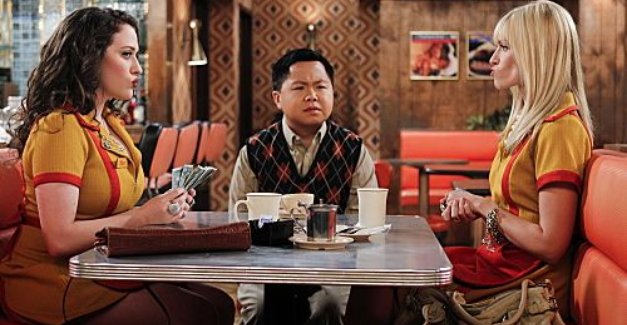
…and Oleg the sexist Ukrainian cook.
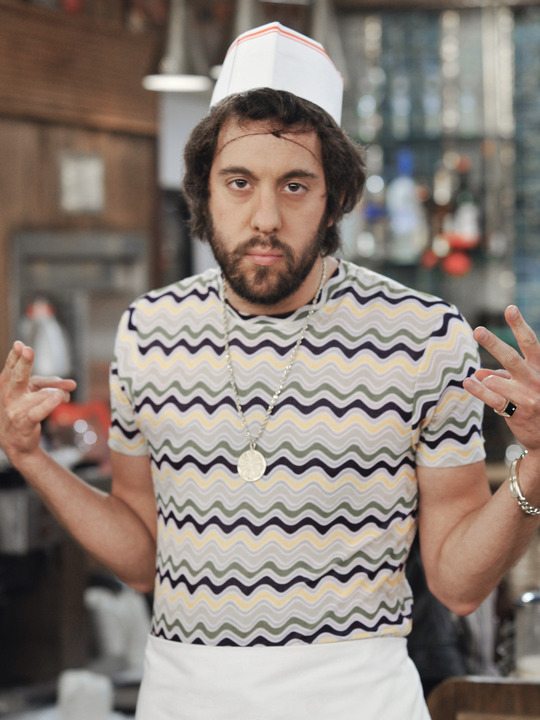
Michael Patrick King described the show as a “big, ballsy comedy” with “a bigger heart than it has balls.” He went on: “I feel that it is broad and brash and very current. It takes place in Williamsburg, New York, which, you know — well, if you don’t know, all you have to do is Google it — is a mash-up of young, irreverent hipsters, old-school oldsters and different nationalities from different ethnic backgrounds. Our show is about two very young, smart girls surrounded by a wide range of supporting characters.”
Furthermore: “We like to say that ‑‑ Nina likes to say we’re an equal‑opportunity offender. I like to say that the big story ‑‑ the big story about race on our show is that so many are represented, that the cast is incredibly, not only multi‑ethnic including the regulars and the guest stars, but it’s also incredibly not ageist. So the big story on our show is we sort of represent what New York used to be and is currently very much still alive in Williamsburg, which is a melting pot.”
When asked about the Asian cook, he replied; “I’m gay. I’m putting in gay stereotypes every week. I don’t find it offensive. . . . I find it comic to take everybody down. That’s what we’re doing.”
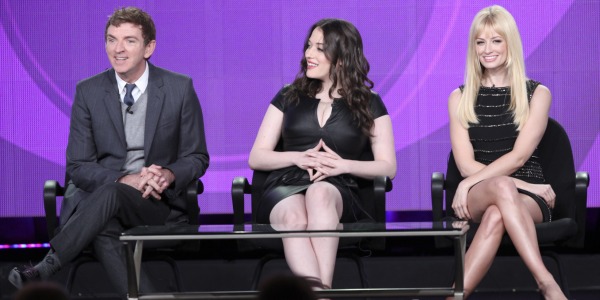
Critics seem genuinely surprised the show is popular despite its racist elements. I can think of a shit ton of things that are popular despite their racist elements: the justice system, the public school system, the cool kids at your high school, etc. I feel like racism is pretty popular in the same way this show is. If people don’t feel personally responsible, they figure it’s okay to sit around and silently reap its benefits.
As fun as making fun of hipsters is, it’s not something I would hang my hat on. It’s interesting that in the same season that Work It gets an outcry from nearly every media outlet, the racism on this show is glanced over by many. Of course Work It‘s entire premise is offensive and it’s egregiously problematic while 2 Broke Girls’ secondary characters rarely have any impact on the plot of the show, but the willingness to simply accept the jokes as part of the show’s appeal reflects how many accept racism in the world.
But that’s the point isn’t it? TV isn’t real. King has the opportunity to create multi-faceted and multi-dimensional characters and instead he relies on good ol’ fashioned racism for a few quick cheap laughs.
Humor is at its best when it’s making fun of everyone and no one at the same time. The jokes on 2 Broke Girls use one person to make fun of a group. The joke is aimed at Han and people like him and is to be enjoyed by everyone but them. When I think of my favorite comedies, the writers use the actors skills and preferences to inform the character then use those complexities to exploit the viewer’s expectations of race, gender, and/or age. How can the actor accomplish that when the most important element he brings to the performance is that he’s Asian?
King seemed completely unaware that there was such dismay with the diner workers which means he’s either never read a review of the show or he’s an idiot. Watching the show, Max seems completely aware of what she’s saying and the implications they have. If anything, she’s too aware that what she’s saying is supposed to be funny, cutting, or derisive. Characters are supposed to be unaware that they’re being funny and their creators hyper-aware of why what they’re doing is hilarious. This whole business of King pretending not to know his characters are stereotypes is poking a hole in the entire process. If it’s funny, people will forgive most anything. So why the hell are people so forgiving of these utterly unfunny characters?




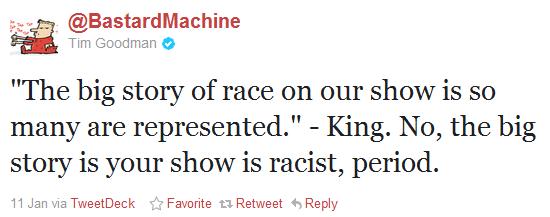
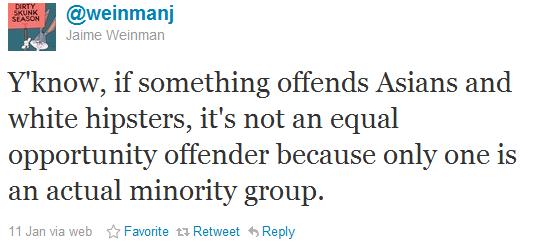
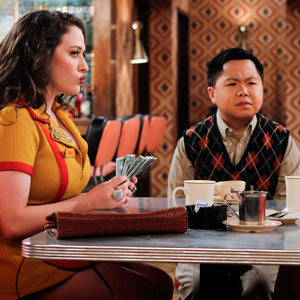




Comments
This is the guy who did Sex and the City? He turned that show’s queer characters into tawdry accessories and lesbian man-haters. You couldn’t have gotten worse representation if it was written by the people who make Two and a Half Men.
“I’m gay. I’m putting in gay stereotypes every week. I don’t find it offensive. . . . I find it comic to take everybody down.”
WHY ARE SO MANY WHITE GAYS SUCH ASSHOLES? Please go join Dan Savage, Ryan Murphy and Rosie O’Donnell and fall in a hole.
Because sometimes human beings are assholes. Sexual orientation doesn’t even enter into that equation.
The very spitefulness of some of these gays makes you wonder what issues they’re harboring, or what warped self-image, or who they expected to be able to push around/look down their noses at but for the tiny fact of sexual orientation. Self-hate coupled with an aggressive sense of entitlement makes an ugly concoction.
This was a great article by the way, Brittani.
Being a jerk is the great equalizer.
“Critics seem genuinely surprised the show is popular despite its racist elements. I can think of a shit ton of things that are popular despite their racist elements: the justice system, the public school system, the cool kids at your high school, etc.” HAHAHAH!!! Love this!!! All that genuinely surprises me is when friends who are good at detecting racism in other shows ignore it in this one. What, the horse is too distracting?
Agreed, that quote was totally made of win.
I think the update on this post from ‘yo is this racist’ is pretty telling:
http://yoisthisracist.com/post/15690024153/what-is-the-most-racist-character-in-tv-or-movies-these
Ugh.
sooo… here’s the thing. i know i’m about to be the unpopular opinion girl over here. but i don’t honestly find 2 Broke Girls THAT problematic. yes the fact that i have to use the emphasis of the the word that is a tell tale sign in and of itself, but still. it’s no more so than the other bullshit that i ignore in our consumerist culture 98% of the time anyway…
i think that the humor of Han’s character, which seems to get more screen time than the other two minor characters in the diner, isn’t in the fact that he’s asian, but in the fact that he tries so hard to fit in with the hipster Williamsburg kids. If he were a short fat white guy it’d be just as funny. And isn’t the rich white girl stereotype equally as problematic? and the kind of slutty / really owns her own sexuality sassy white girl? I feel like the white characters are easily just as stereotyped into oblivion as the others. and so, yes, in a world of privilege that means it’s racist, but honestly, all the characters are equally as 2 dimensional, equally as made fun of, and equally as hilarious.
The reason why the rich white girl stereotype isn’t equally as problematic is because the humour is at the expense of Caroline as a character. When there’s a joke about her obsession with coupons it remains about -her- and not all white women in general. The humour that you get by mocking Han for liking karaoke? It’s not funny because of what we know of Han, it’s funny because “Haha! Asians and bad karaoke!”.
In other words, it’s not symmetrical. See: http://xkcd.com/385/
i think white people loving to coupon is a thing too.
shouldn’t it be?
but i yield to you for three reasons 1. you’re more articulate than me, 2. b/c of this i think you make a better argument, and b. you obviously watch a lot more of this show than me, i couldn’t even remember the characters’ names.
I thought it already was?
I totally read: Oleg the sexist Ukrainian cock.
Oh man, Oleg’s shirt in that picture makes me dizzy, it hurts to look at it.
More seriously, I was appalled at what MPK said at the Press Tour, he showed a complete lack of awareness. I haven’t been enjoying the show much lately anyway and this just gave me another reason to stop watching it.
ummmm yeah, so I WAS reading the article and getting progressively more pissed off (despite the fact I love this show) and then we got to the picture of Kat Dennings in what appears to be leather or a leather look-a-like dress with amazing cleavage.
Yeah….can’t stop loving a show that lets me see that on a weekly basis.
I don’t think there’s anything wrong with a well placed politically incorrect joke or two, we have all made them at some point and depending on the spirit behind them and the situation they aren’t always harmful. But I feel I may be in the minority of minorities who feel that way :P What bothers me about the way its done in this show is I feel like they’re just sort of thrown in in ways that don’t always make any sense. If your going to make a questionable joke, at least make it fit the situation.
I had to stop watching, despite my love for Kat Dennings. At some point, as creator of this show, you HAVE to admit you’ve fucked up and make some changes. I mean right? Right????
Also, should the fact that they got rid of the damn horse as a plot device give me hope or is that just a pipe dream?
“When I think of my favorite comedies, the writers use the actors skills and preferences to inform the character then use those complexities to exploit the viewer’s expectations of race, gender, and/or age.”
Yes – really well said.
The reliance on outdated racial stereotypes for humor is so unfortunate, especially since the experience of living in extremely culturally diverse cities can provide so much potential for humor that doesn’t perpetuate harmful stereotypes. It’s laziness, and it’s too bad because I feel like this show has a lot of potential otherwise.
While I can look past the racial jokes and enjoy this show(/Kat Dennings’s sass) for the most part, I have to say that I find the treatment of Han’s character extremely offensive. Not only is his character a ridiculous stereotype, but the way he is treated by the other characters on the show is obscenely disrespectful and emasculating. Having the main characters of this show constantly mock their employer because he is a short Asian man sends some pretty harmful messages about how it’s okay to treat Asian people in general. I am a broke white girl and I’ve worked for Korean men, and, trust me, this shit would not fly in real life.
Am I the only one that likes this show?
At one point I was kind of afraid and ashamed to say I do think it’s funny because of everyone’s reviews.
I’ve also been wondering if the minority they’re re making funny of is really offended or is it just a lot of people commenting on how offensive it is and thus getting offended for everyone else?
To be honest a lot of these jokes have in someway targeted me and I’ve never felt personally offended. And this is coming from a person who is partially sensitive to racism, because I am multiracial.
Keep in mind I’m not saying these jokes are offensive, because they are, I’m trying to say I’m not offended and according to these comments I should be…?
As an Asian American, yes I am extremely offended by the treatment of the Asian character on this show. This might be entertaining and humorous to you, but to us it is another character in a long tradition of such characters (Yunioshi from Breakfast at Tiffany’s and Long Duk Dong from Sixteen Candles) who have perpetuated this awful stereotype of Asian people. The problem is that these images of Asians travel beyond the screen and into the ways that people view Asians in America. You get your cheap laughs, but we get the racism in the end.
I really like 2 broke girls. at least it’s diverse, people are complaining about these characters (Oleg,Han,e.t.c) but if they weren’t there these same people would probably say the show isn’t diverse enough. Also, they dont make fun of Han because he’s Asian, they make fun of him for the things he does like trying to be a hipster, raising the price of tampons and so on
“they dont make fun of Han because he’s Asian” Ashley
Good, then the White writers can have Han sell the restaurant to a short White guy.
I rather prefer not see any Asian American male on TV or movies, if the White writers are going to portray them in negative stereotypes.
[…] bridges, poutine, Ringo Starr and a group of rag-tag musical aspirants forced to toil away at a racist diner in order to feed their pet […]